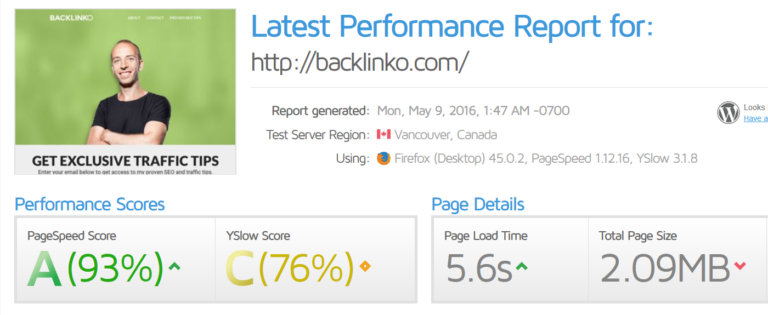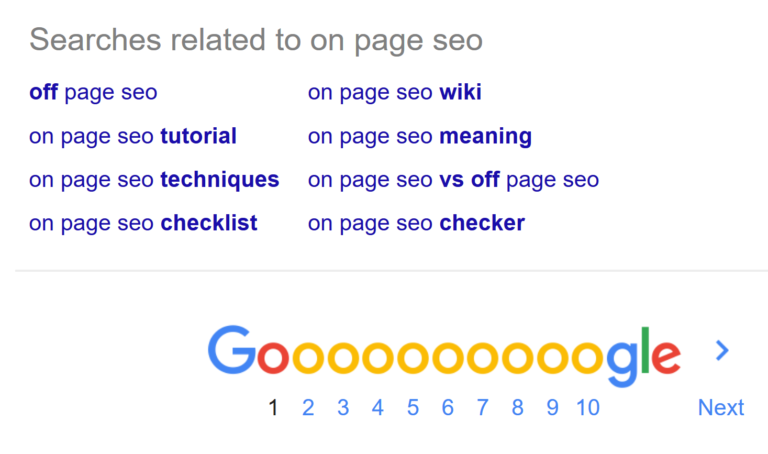Use SEO-Friendly URLs
Google has said that the first 3-5 words in a URL are given more weight. Thus make your URLs sweet and short. And always include your target key word in your URL. In other words: Avoid awful URLs: domain.com/p=123 Or URLs: domain.com/8/6/16/cat=SEO/on-page-seo-is-so-amazing-omg-its-the-best
Boost Website Speed
Google has said that page loading speed is an SEO ranking signal. You'll be able to increase your site speed by compressing images using a CDN, and changing to more rapid hosting.
Ensure that your website doesn’t take more than 4 seconds MunchWeb found that 75% of users wouldn’t re visit a website that took longer than 4 seconds to load. It is possible to assess your website’s loading speed using the outstanding GTMetrix.com: Cache plugins and CDNs are fine, but investing in premium is the #1 thing you certainly can do to produce your website faster.
$5/month hosts are decent for the money you’re paying. But they don’t hook you up with serious speed. I’ve literally dropped load times from 6 seconds to less than 2 seconds by switching from a $5 shared hosting plan to some topnotch host (I use Synthesis Hosting here at Backlinko). From a Search Engine Optimization and conversion standpoint, the ROI of superior hosting can’t be overcome.

Beginning Title With Key Word
Your name tag is the most crucial on-page Search Engine Optimization factor. Generally, the closer the key word would be to the beginning of the name tag, the more weight it's with search engines like google. You don’t constantly need to start your name tag by means of your target key word. But when there’s a key word that you’re gunning for, attempt to put it towards the beginning of your name.

Sprinkle LSI Keywords
LSI key words are synonyms that Google uses to discover a page’s relevancy (and possibly quality). Sprinkle them into every post.
I do because I normally write EXTREMELY content, n’t go nuts about LSI keywords.
(Long content raises the odds that you’ll naturally use LSI key words). But when you want to make 100% certain that you’re using LSI keywords, search on your key word in Google and scroll right down to the “Searches Related to…” area in the bottom of the page: Throw one or two of these into your post.

Use Internal Links
Internal linking is SO cash. Use 2-3 in every post. Check out Wikipedia in the event you want to determine a fantastic example of how to internal link in your web site.
They add keyword-loaded internal links to every entry: Because they’re Wikipedia, obviously, they're able to get away with 50 internal links per page. I advocate a simpler (and safer) approach: link to 2-5 mature posts if you publish a new one.
Use Societal Sharing Buttons
Societal signs might not play a direct role in ranking your website. But shares that are societal create more eyeballs on your articles.
And the more eyeballs you get, the more likely someone is to link for you. So don’t be bashful about putting social sharing buttons conspicuously on your site. The truth is, a study by BrightEdge found that social sharing cans increase .
Societal signs aren’t an important part of the Google algorithm. But you may be given an indirect rankings boost by societal shares on sites like Facebook, Twitter and Google.
Dazzle with Multimedia
Text can only take your articles up to now. Engaging images, videos and diagrams can reduce increase time and bounce rate on site: two crucial user interaction ranking factors.
Because I steadfastly think that my content is made by it straight upward better that’s.
But it has a pleasant SEO gain to boot: multimedia can help you boost those user-interaction signs that Google has been paying a lot more attention to. And it raises the perceived value of your content –which means that people are prone to link to it.
Use Outbound Links
This can be a simple, white hat SEO strategy to get more traffic. Outbound links to associated pages helps Google figure out your page’s subject. It also demonstrates Google your page is a hub of quality info.
Not linking out might be the #1 on-page Search Engine Optimization mistake that I see people make. I attempt to use 2-4x outbound links per 1000 words. That’s a good rule of thumb for the majority of websites.
Bear in mind that the sites you link out to reflect on you. Thus make sure whenever potential to link out to ability sites.
No comments:
Post a Comment